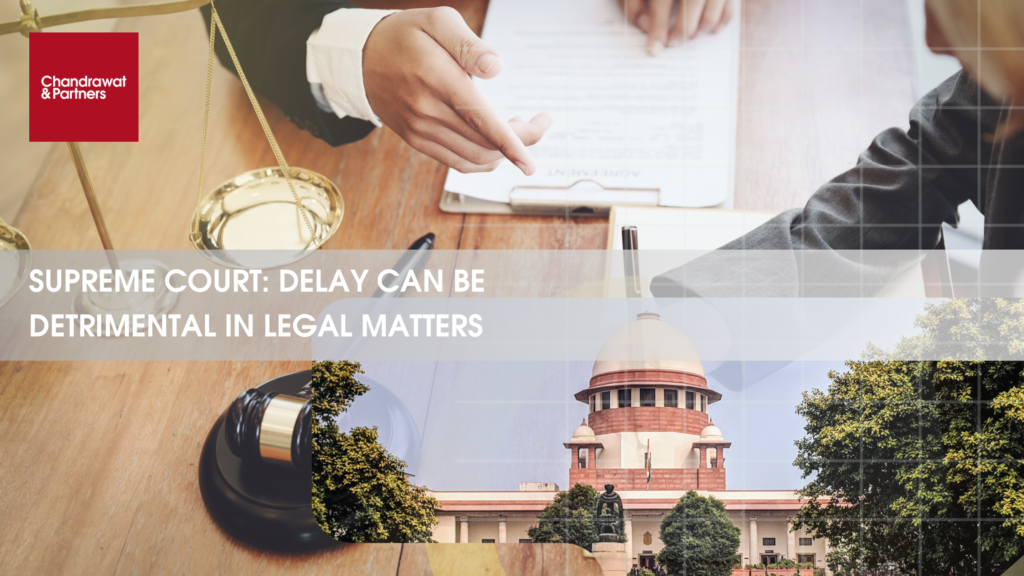Home > Recent judgements> Supreme Court: Delay Can Be Detrimental In Legal Matters
May 01 , 2024

Share :
PREFACE
In a recent judgment titled Mrinmoy Maity versus Chhanda Koley & ors, the Supreme Court of India reiterated the importance of prompt action in legal matters. The case highlights the principle of “delay defeats equity,” emphasizing that the High Courts, while exercising their extraordinary jurisdiction under Article 226 of the Constitution, should be wary of granting relief to petitioners who exhibit undue delay.
THE CASE
The dispute arose from the allotment of a distributorship by Bharat Petroleum Corporation Limited (“BPCL”). The appellant, was chosen for the distributorship but was initially allotted encumbered land for constructing the required warehouse and showroom. BPCL subsequently offered him alternate land. Respondent no. 1, the unsuccessful bidder, challenged this move through a writ petition in the High Court four years after the initial allotment to Mr. Maity.
THE HIGH COURT’S FLAWED REASONING
The High Court’s decision in this case was particularly unclear and delayed on the part of respondent no. 1. The Court apparently did not consider the fact that the petitioner had waited for four years before filing a writ petition challenging the allotment. This delay was substantial, especially considering that respondent had been awarded the distributorship and was even offered alternate land by BPCL in the meantime. The Supreme Court’s subsequent judgment makes it clear that such a lengthy wait can be detrimental to a petitioner’s case. It highlights the importance of acting with reasonable promptness when seeking legal recourse, especially through extraordinary remedies like writ petitions.
SUPREME COURT’S DECISIVE STAND
The Supreme Court stepped in and corrected the High Court’s error. The Court emphasized that timely action is essential in legal matters. The doctrine of “delay defeats equity” discourages parties from sitting on their rights for an unreasonable period of time before seeking legal recourse. The Court outlined several reasons for this principle:
- Preserving evidence: Delay can make it difficult to gather and present accurate evidence. Witnesses become unavailable, and documents may be lost or misplaced. When a petitioner waits a significant amount of time before filing a lawsuit, the court may be unable to reconstruct the events in question fairly and accurately.
- Protecting against manufactured claims: Outdated claims, those brought forth after a long delay, are more susceptible to fabrication or manipulation. The Court discourages such tactics by requiring petitioners to bring their claims forward within a reasonable timeframe.
- Ensuring fair play for all parties: Delay can prejudice the respondent’s ability to defend themselves. As time passes, memories fade, and witnesses become unavailable. Additionally, the respondent may have taken actions in reliance on the original decision, making it difficult or unfair to reverse course years later.
- Efficient use of judicial resources: Courts have limited resources and a heavy label. By discouraging frivolous or delayed lawsuits, the Supreme Court encourages the efficient use of judicial time and resources. These resources can then be allocated to resolving more pressing matters.
In the present case, the Court found that respondent no. 1 was aware of the developments since 2014 but only challenged the allotment after three years, when the alternate land was offered. This delay and inaction amounted to lapse, disqualifying them from relief. The Court’s decision serves as a cautionary tale for potential litigants. Delaying legal action can not only weaken one’s case but also hinder the fair and efficient administration of justice.
JUSTICE FAVORS THE VIGILANT
The Supreme Court’s judgment serves as a vital reminder for all potential litigants. Justice is often time-sensitive. Delaying legal action can not only weaken the case and lead to unfavorable outcomes, but it can also cause unnecessary stress and hardship. The longer one will wait to pursue legal rights, the more difficult it may become to gather evidence, locate witnesses, and effectively argue in an individual’s case. Additionally, delays can embolden the opposing party and make them less likely to negotiate a fair settlement.
For more information or queries, please email us at
[email protected]




